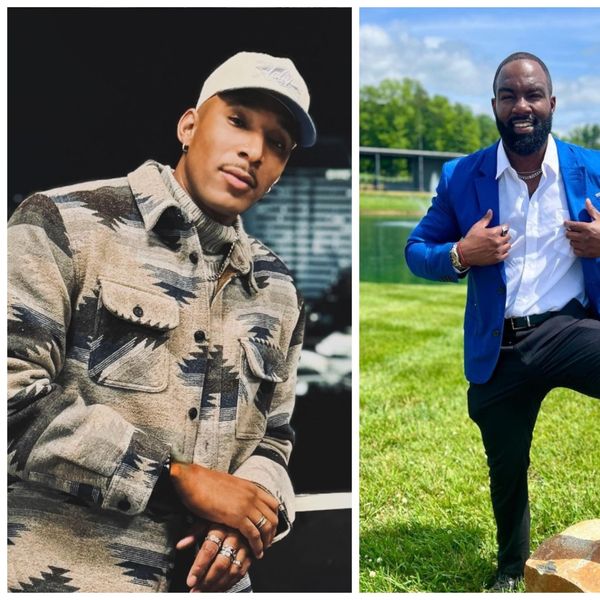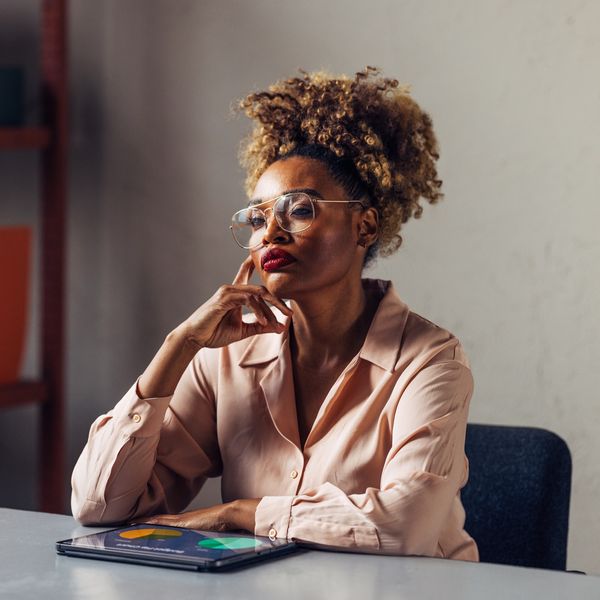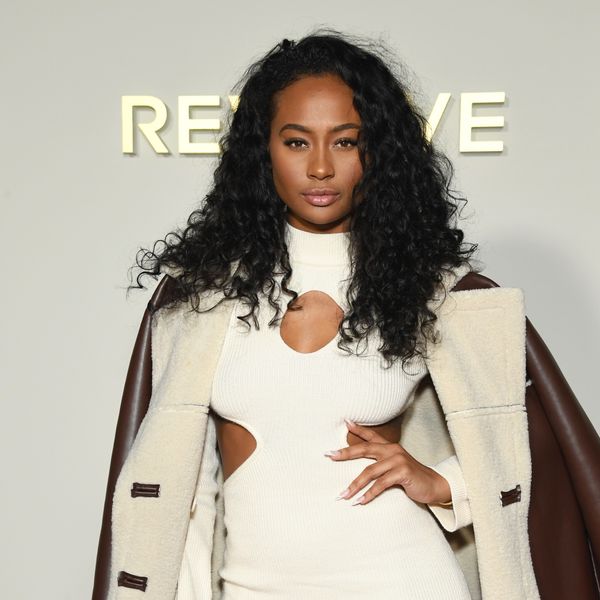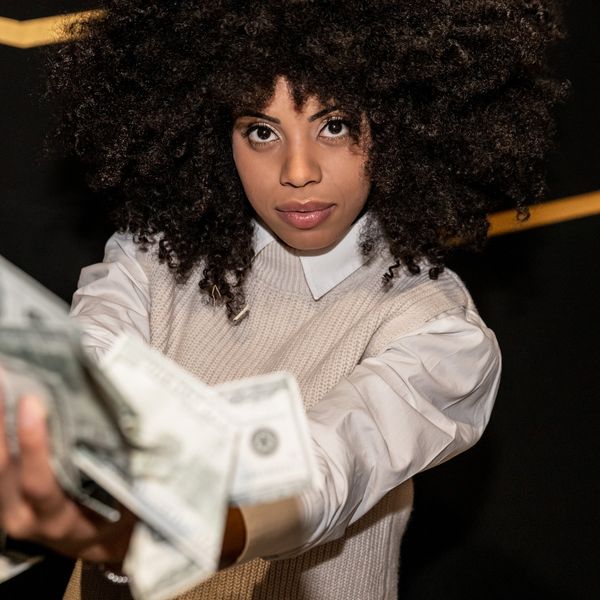Broadway Dancer Opens Up About Her Journey With Scoliosis And Her Go-To Self-Care Practices
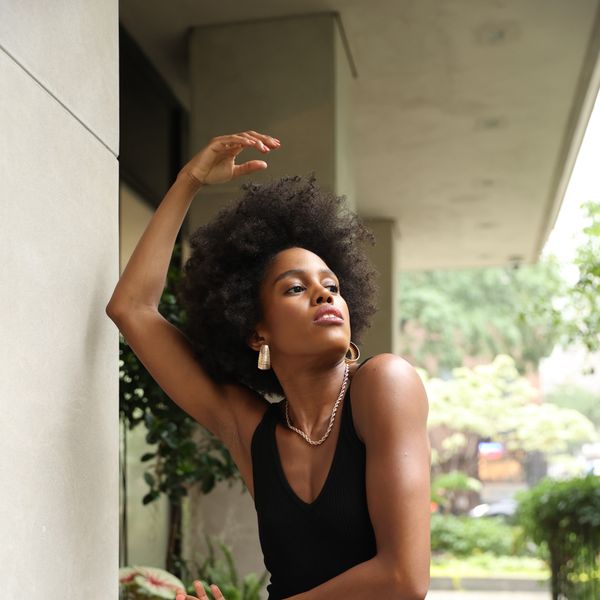
Paige Fraser is showing others that there is life beyond a scoliosis diagnosis. She was diagnosed in her freshman year of high school after getting accepted into its prestigious dance program and described that moment as “traumatizing.” While her doctor told her that she may need surgery in the future, she was fortunate to find alternative methods, which included wearing a back brace and seeing a chiropractor twice a week.
“It just was a really difficult, dark time for me my freshman year because I had to process all of those emotions while still showing up. And like being a dancer and putting my best foot forward and pushing through,” she tellsxoNecole. “I think aside from the support of my parents, my love of dance and my dream of becoming a professional dancer is what kind of kept me focused and allowed me to just tap into why I was doing what I was doing.”
Fast forward years later, Paige has danced for Beyoncé and the legendary Alvin Ailey dance company and is currently in The Lion King on Broadway, proving that scoliosis can’t stop what’s for you. Scoliosis is a sideways curve in your spine that, according to Cleveland Clinic, affects over six million people in the U.S. June is National Scoliosis Awareness Month, and Paige is using her platform to share her story and educate others on the disability.

Photo by Tatiana Katkova
Not only is she a scoliosis advocate, but she also serves as the chief artistic officer and program director for dance for The Paige Fraser Foundation, which her aunt, Lesmah Fraser, founded in her honor. The Paige Fraser Foundation is a 501(c)(3) community-based non-profit organization that focuses on art and wellness programs for people with or without disabilities.
“Of course, it's named after me, but it's bigger than me, in a sense. We offer art programming and dance, visual arts, music, theater, and wellness. And over the last six years, it's been beautiful to see these programs grow,” she shares. Paige is also the mastermind behind the Spine Series, which they have every June for National Scoliosis Awareness Month.
“In June, we have a program called Spine Series, and I founded that program specifically during the pandemic because we were all stuck inside, and that's one thing with scoliosis, you never want to just be sitting, right?” She says. “Movement helps any kind of bone and joint deformity. So I pitched Spine Series to the board, and they loved it, and this year is our fifth year offering it, and it's offered on Zoom. And what I love about it is it's accessible to people all over the world.”
“In June, we have a program called Spine Series, and I founded that program specifically during the pandemic because we were all stuck inside, and that's one thing with scoliosis, you never want to just be sitting, right? Movement helps any kind of bone and joint deformity. So I pitched Spine Series to the board, and they loved it, and this year is our fifth year offering it, and it's offered on Zoom. And what I love about it is it's accessible to people all over the world.”

Photo by Tatiana Katkova
“And we've seen people from all over the world participate in Spine Series, and that's really just another beautiful reminder and affirming that like I'm not alone in this journey with scoliosis, and there are people craving information to feel better.”
Living with scoliosis, it’s important to take care of your body. Being a professional dancer, Paige is constantly challenging her body every day, so one of the key things she learned to do was to listen to her body and give it the proper care it needs. That includes taking a Pilates class, acupuncture, getting a massage, or seeing a chiropractor. This can also help prevent flare-ups, and if you are experiencing flare-ups, she says it might be a sign that something is wrong.

Photo by Tatiana Katkova
“I'm so grateful for this conversation and the ongoing conversations I've been having because it's not one size fits all. There are some people who get diagnosed, and they need the surgery, but then the thing is, after the surgery, you still have to take care of yourself,” she says. “You can't just rely on that. There still has to be a practice in place that keeps you connected with your body. A lot of scoliosis is alignment. It's alignment issues, which cause breathing issues, which can cause mobility issues, right? So to prevent that, it's better to just get ahead of it and really do research.”
While Paige will always continue her advocacy, she knows that at some point, she will have to transition from performing. However, that doesn’t mean she will leave the arts forever. She is currently pursuing her master's degree in arts and culture advocacy and will graduate in August. She also reveals that she is getting into filmmaking and helping her mom bring her stories to life.
Follow Paige on Instagram and learn more about The Paige Fraser Foundation.
Let’s make things inbox official! Sign up for the xoNecole newsletter for daily love, wellness, career, and exclusive content delivered straight to your inbox.
Feature image by Tatiana Katkova
London Alexaundria is the contributing editor for xoNecole. She is an alum of Clark Atlanta University, where she majored in Mass Media Arts and has worked in journalism for over ten years. You can follow her on Instagram and TikTok @theselfcarewriter
There’s just something about HBCU Homecoming that just hits different. Whether it’s your first time stepping onto the yard since graduation or you’re a regular at every Homecoming tailgate, HBCU pride is undeniable. It’s a vibrant celebration that unites the legacy of excellence and tradition with the energy and resilience of Black culture.
The experience goes beyond a typical college reunion; HBCU Homecoming is a family reunion, a fashion show, a cultural festival, and a week-long turn-up that embodies what it means to be unapologetically Black and educated. For HBCU alumni, the journey back to the yard each year is rooted in a love and pride that’s hard to put into words but impossible to deny.
From statement pieces to tech must-haves, every item represents the intersection of Black pride and HBCU love, ensuring that you show up to the yard in style and with intention. So whether you’re repping your alma mater for the first time since graduation or looking for fresh pieces to express your HBCU pride, these essentials will have you standing out, because, at HBCU Homecoming, it’s not just about showing up—it’s about showing out.
Thread Goals
diarrablu Jant Pants in Alia Noir

High-waisted, wide-legged, and ready to shut down the yard, the Jant Pants by diarrablu bring a whole new meaning to campus chic. Handcrafted in Dakar, Senegal, these free-flowing jacquard pants are perfect for stepping onto the yard with style and ease—making them a must-have for any HBCU alum’s closet.
Silver & Riley Convertible Executive Leather Bag Classic Size in Olive

This all-in-one luxury bag isn’t a bestseller for nothing. The Silver & Riley essential is made of Italian calfskin leather and thoughtfully designed, as it can be worn in four different ways: a shoulder bag, crossbody, a top handle, and a backpack. Chic and elegant, the Convertible Executive Leather bag is “the bag that every woman needs in her collection.”
Renowned Women's Intuition Cotton Graphic T-Shirt

Renowned
Renowned’s Women’s Intuition Cotton Graphic T-shirt features a bold graphic print inspired by the power and essence of women’s intuition. With its striking design, this all-cotton tee is a vibrant thing, making it a statement piece that celebrates feminine energy.
Mifland Million M Mesh Crop Shirt

Talk about bold, the Million M Mesh Crop Shirt combines edgy style with comfort, featuring Mifland’s signature print on a semi-see-through mesh fabric. Show up and show out in sophisticated flair.
HBCU Love FUBU
Melanin Is Life Melanated & Educated - I Love My HBCU Hoodie

Show off your HBCU love with this piece that represents everything you gained from your alma mater: a top-tier education, a community that lifts you up, and a deep sense of esteem for yourself and your culture. Wear it loud and proud, because being melanated and educated isn’t just a flex—it’s a legacy.
HBCU Culture Spelmanite Sweatshirt in Navy

Spelmanites, rep your Spelman pride with this unisex crewneck sweatshirt, designed for ultimate comfort and a relaxed fit. Made from a cozy cotton/polyester blend, this classic sweatshirt is as durable as it is stylish—making it an ideal piece for any Spelmanite showing love for their alma mater.
HBCU Culture Howard Is The Culture T-Shirt

Rock the ultimate flex by showcasing your Howard U love with HBCU Culture’s Howard Is The Culture t-shirt. This unisex tee offers a comfortable, relaxed fit that’s perfect for celebrating your HBCU spirit without sacrificing style or comfort.
DungeonForward FAMU - Strike Bucket - Reversible

DungeonForward’s Strike Bucket Hat brings versatility and style to the FAMU Crown collection with its reversible design, giving you two looks in one. Featuring a sleek black snakeskin-embossed brim lining and a bold outline Rattler emblem, this hat is all about repping your Rattler pride in style.
DungeonForward Savannah State University - HBCU Hat - TheYard

The Savannah State University HBCU Hat by DungeonForward is more than just a hat—it’s a symbol of Tiger pride and a nod to the culture. Perfect for gamedays, tailgates, or just showing off your HBCU love, this hat lets you carry a piece of the yard wherever you go.
Tech the Halls
Anker iPhone 16 Portable Charger, Nano Power Bank

Stay charged up with the Anker Nano Power Bank, which features dual USB-C ports, a foldable connector, and a compact design, making it perfect for those HBCU tailgates and late-night parties you pull up to.
Drip Check
Wisdom Frame 14 Square Sunglasses

Elevate your look with these angular square-frame sunglasses by Wisdom, bringing an ultramodern edge to any outfit. The sleek design makes them perfect for blocking out the haters while you stunt on the yard.
Coco and Breezy Eyewear Fortune in Gray Turquoise

The Fortune Glasses in Grey Turquoise is a bold statement piece to any Homecoming weekend ‘fit that “embody our fearless and outspoken DNA.” With their color and edgy design, these frames by Coco and Breezy are perfect for anyone looking to stand out and express their unapologetic confidence.
Howard U Lapel Pin

Rep your Bison pride wherever you go with this Howard U Lapel Pin from Pretty AmbVision. Whether adding it to your jacket, shirt, or bag, this pin is the perfect way to showcase your love for your alma mater while rocking your HBCU love with honor and distinction.
Mifland Standard Rucksack Mini

The Standard Rucksack is designed to evolve like that HBCU pride—getting richer, bolder, and better with time. Durable, stylish, and built to last, this Rucksack by Mifland is a timeless piece equipped with versatile carrying options and fully adjustable back straps for ultimate comfort.
Stay Fresh, Stay Blessed
Slip Pure Silk Sleep Mask in Pink

Keeping it cute starts with beauty sleep. This luxurious silk mask is an essential for a reason. If protecting your skin and waking up refreshed is your priority, look no further than this Homecoming essential.
Liquid I.V.® Hydration Multiplier Lemon Lime - Hydration Powder Packets

Stay hydrated and energized throughout Homecoming weekend with this Liquid I.V.® Hydration Multiplier in Lemon Lime. Just add a packet to your water bottle, and bless your body with 2-3 times more hydration than water with every packet. Because staying hydrated is the key to popping up and showing out all weekend long!
Loop Experience Plus Earplugs High Fidelity Hearing Protection

Designed for your hearing protection, these sleek earplugs reduce noise without compromising sound quality—perfect for enjoying the band’s halftime show, late-night parties, and DJ sets. Whether you’re front row at the step show or hitting the yard, your ears deserve to be protected in style!
Black Girl Magic Glass Cup

Sip in style and celebrate your melanin with the Black Girl Magic Glass Cup. Perfect for morning coffee, your favorite iced drink, or showing off your HBCU pride on the yard—this cup is all about keeping it cute while radiating your endless supply of Black Girl Magic.
Glow Up & Show Out
Black Girl Sunscreen SPF 30

What Homecoming weekend can be complete without an assist from this beauty find? Formulated to blend seamlessly into melanin-rich skin (no white-cast), protect your glow while you turn up with the Black Girl Sunscreen SPF 30.
Sienna Naturals Issa Rae's Wash Day Ritual Set

Issa Rae’s Wash Day Ritual Set from Sienna Naturals includes the H.A.PI. Shampoo, the Plant Power Repair Mask, Dew Magic, and Lock and Seal to get your crown right. Whether you’re repping your coils or rocking a new color on the yard, these products restore and nourish your strands, keeping your hair healthy, strong, and Homecoming-ready!
54 Thrones Ivorian Cocoa + Ghanaian Coconut Beauty Butter

Stay glowing from the tailgate to the after-party with the 54 Thrones Ivorian Cocoa + Ghanaian Coconut Beauty Butter. Infused with African-sourced ingredients, this rich, multi-purpose butter is the answer to keeping your skin soft and radiant through all the festivities all Homecoming long.
Saie Glossybounce Hydrating Lip Oil

Keep your lips looking luscious and nourished with the Saie Glossybounce Hydrating Lip Oil. Perfect for adding an extra pop to your pout before hitting the yard or freshening up between events, this lip oil is a beauty essential for staying camera-ready all weekend.
Join us in celebrating HBCU excellence! Check out our Best In Class hub for inspiring stories, empowering resources, and everything you need to embrace the HBCU experience.
Featured image by Visual Vic/Getty Images
Okay, so when you hear the term “mental health,” what immediately comes to your mind? As a marriage life coach, for me, it’s oftentimes articles that have to do with some sort of mental health-related crisis or, even when it comes to many of my clients, trying to help a relationship when it’s on the brink of total and utter despair. That’s really unfortunate too because, in my opinion, if more focus was placed on signs that we are in a great mental space and more tips were provided on how to either get or remain there, I think a lot of us would find ourselves in far more positive space — a lot more of the time.
And just what are some indications that you’re doing well on the emotional wellness tip? You really like yourself. You treat others the way that you want to be treated. You live with a spirit of gratitude. You know how to adjust well to change and differences (within and outside of yourself). You are aware of your purpose and are doing all that you can to manifest it on a daily basis (check out “What Does It Mean To Have 'Purposeful Relationships'?,” “Please Stop Picking People Who Don't 'Fit' Your Purpose” and “How To Handle 'Purpose Fatigue'”).
And how do you know when it’s time to put everything aside and tend to your mental health? When you feel any type of extreme fatigue, whether it’s physical, mental, or emotional; when your attitude is sarcastic, cynical, or apathetic; when you’re not giving your best to what you are doing (or have no clue why you are doing some of the things that you are doing); when you’re sacrificing too much of who you are in order to make something (or things) work, and/or when your spiritual self is compromised.
Today, if any of those warning signs just resonated with you, I’m gonna do you a solid. In the spirit of getting — and keeping — you in a great mental health state, here are 12 hacks that can help you out if you’re needing a bit of a right-now-pick-me-up.
1. Wear a Bright Color

Unsplash
Whether you choose to believe it or not, color psychology is a very real thing. Yep, there is quite a bit of data out here to support that the colors that you choose to surround yourself with can have an impact on your mood(s). For instance, I read an article that said over half of individuals associate black with sadness, red with love, and yellow with joy.
So, if you happen to wake up on the wrong side of the bed one morning, before you pull out something black because perhaps it’s slimming or even convenient, why not go with a bright hue instead? Orange can give you an energy boost, green conveys joy and lilac cultivates a feeling of calm. (Color) psychology says so.
2. Rub Some Clementine Oil on a Pressure Point

Unsplash
Something that I’m always gonna be good for is hipping you to an essential oil that you may not have heard of before, and today, it’s clementine oil. Whether you’re looking for a way to strengthen your immunity, bring some health and beauty to your skin, or want to feel better on your way to work (or you need something that will help you to get you through the rest of your workday), clementine oil has a reputation for making all of these things happen.
The reason why it’s a good idea to apply it to places like your hands or feet is because there are many nerve endings in both spots that connect throughout your body. Plus, essential oils have a tendency to absorb well (and fast) in those places, too.
3. Snack on Some Sunflower or Pumpkin Seeds

Unsplash
If you’ve always looked at snacking as a low-key cuss word, this would be the day to stop doing that. So long as you snack on the right kinds of foods and do it in moderation, it can actually be beneficial for you. For instance, as far as your mental health is concerned, snacking can help raise your blood sugar levels (in a good way) and provide you with an energy boost.
Two low-calorie snacks that are especially beneficial as far as maintaining your mental health is concerned are sunflower seeds and pumpkin seeds.
Sunflower seeds contain magnesium and zinc which can help calm your nerves (yes, literally), along with vitamin E (which reduces oxidative stress) and protein (which boosts brain health). As far as pumpkin seeds go, they also are an excellent source of magnesium and protein, plus they have a lot of manganese in them which is a nutrient that helps improve brain health and even reduce PMS-related symptoms.
4. Listen to Some Pop. Or Hip-Hop.

Getty Images
While checking out an article entitled, “Improving Mental Health Through Music,” I got to thinking about how listening to Michael McDonald’s “I Can Let Go Now” will damn near turn me into a basket case, and yet The Pharcyde’s “Drop” (which is one of the best visuals ever made; I’m not debating it either) will immediately get my head to bobbin’ and my mind to feeling great.
Yes, music is powerful, and we really need to be careful when it comes to what we listen to…and also when. Anyway, if you’re curious about which genres are reportedly best for your mental health (because they help to release the feel-good chemical dopamine into your system) — pop, hip-hop, alternative, rock, classical (if you need help focusing), and jazz can reduce stress and even increase longevity.
5. Take a Power Nap

Getty Images
It’s pretty common for people to ask me how I am able to write about relationships and then listen to people talk about them without losing my mind. Well, for one thing, God made me this way. That said, one of my surefire hacks is to take a freakin’ nap — especially after a long session (some of mine last for two hours at a time!). Listen, even if you can only get 15 minutes in (anything over 30 minutes is more than just a simple power nap, by the way), it can help reduce fatigue, increase awareness and alertness, and help you feel good so that you will perform better.
Chile, naps shouldn’t be seen as something that only kindergarteners do. Adults would be so much more pleasant to be around if more got a power nap in as well.
6. Put a “Timer” on Your Social Media

Unsplash
There’s no telling how many times on this platform I’ve said that the average American spends a whopping 2.5 hours on social media on a daily basis. That’s five 30-minute sitcom episodes — yes, that is a long time. What’s wild to me is while parents will talk about their kids needing their social media time monitored because too much is not good for their mental health (which is true) — parents need to lead by example because data says that when not consumed in extreme moderation, social media isn’t the best for grown folks either.
All of that information — especially the negative stuff, and there is PLENTY of that — increases anxiety, disrupts sleep, can lead to memory loss, may cause you to feel lonely, and can do a real number on your self-esteem. So, how much time should be allotted to your Instagram and TikTok accounts? Many mental experts say somewhere around 30 minutes a day should be the max.
And listen, if you just read that and can’t even fathom that timeframe because you feel like you’d go crazy without more time online, you’re the main one who should try it out (check out “10 Ways To Keep Social Media From Triggering You (So Much)” and “8 Solid Reasons To Put. Your Phone. Down.”). #justsaying
7. Put a “Timer” on Your Worries Too

Unsplash
Roy T. Bennett once said, “Instead of worrying about what you cannot control, shift your energy to what you can create.” Marcus Aurelius once said, “Never let the future disturb you. You will meet it, if you have to, with the same weapons of reason which today arm you against the present.” The Dalai Lama XIV once said, “If a problem is fixable, if a situation is such that you can do something about it, then there is no need to worry. If it's not fixable, then there is no help in worrying. There is no benefit in worrying whatsoever.”
And do you know what all of these quotes have in common? A reminder to not be a control freak and to be more flexible in life. Now, is worrying normal? It is. However, what I will tell you from very up close and personal experience is a lot of ego is caught up in worry because, essentially, we’re trying to control what oftentimes can’t be controlled. Once humility comes into play, once you accept that all you can do is your best, once you don’t try to create every “puzzle piece” of a particular overall picture, you’ll be amazed at how calm you become.
I didn’t say that you’ll like or understand what’s going on; I’m just saying that you won’t be trying to do more than what you can — or should. Even biblical Scripture says, "Therefore I say to you, do not worry about your life, what you will eat or what you will drink; nor about your body, what you will put on. Is not life more than food and the body more than clothing?" (Matthew 6:25 — NKJV) So, if something has you worried right now, say to yourself, “I’m going to semi-obsess over this for 30 minutes, and then I’m going to just do my best and let it go.” It’s the hack of all hacks. Try it and see.
8. Turn Off Your Notifications for Half of the Day

Getty Images
I seriously doubt that any of you are surprised to know that almost 60 percent of Americans think that folks are far too addicted to their phones. To prove that point, I once read that most of us tend to look at our phones as much as 144 times a day. SMDH. And in between constantly staring at your screen and then hearing (or feeling if they’re set on vibrate) your notifications going off — it’s no wonder you and others are feeling more stressed out and distracted than ever.
That’s why, at the very least, consider turning your notifications off for half of the day — at least when it comes to your social media accounts. Very few of my notifications make a sound, and life is good that way. And honestly, whatever someone wants me to know (or I’m being nosy about), it’ll be there when I get around to it. The earth isn’t going to crumble if it’s not immediately. TRUST ME.
9. Get into a Yoga Position (or Two)

Getty Images
If stress, anxiety, or even depression-related symptoms are something that you struggle with, you might want to sign up for a yoga class. Science has proven that yoga can help to create calm and clarity, and it can even help to center you. And what if you are feeling low or somewhat off-kilter and you need an immediate boost? Yoga poses like the Upward Salute, the Modified Child Pose, and the Easy Pose (all of which are demonstrated here) are ones that you can easily do wherever you are — whether you have a yoga instructor around or not.
10. Buy Yourself Some Flowers

Unsplash
Something that I used to do, that I really need to get back into the habit of doing, is buying myself a bouquet of fresh flowers. It used to be a practice of mine to pick some up every Friday, and it has just…slipped away from me lately. Aside from the fact that doing it makes me feel pretty and feminine, science backs the mental health benefits of flowers.
Research says that flowers can immediately make you feel happier, and if you’re feeling a lil’ stressed out, they can help you to feel calmer as well. And even though pretty much any floral arrangement can help you out in this department, if you’re curious about what different blooms represent, there is a very comprehensive list that you can check out here.
11. Do Something for Someone Else. Anonymously.

Unsplash
King Solomon once said, “So are the ways of everyone who is greedy for gain; It takes away the life of its owners.” (Proverbs 1:19 — NKJV) When it comes to money and resources, greed, hoarding, or selfishness has never been my thing. I like to give (I very rarely loan; that too can lead to unnecessary stress) in part because it’s fun to see how the universe will give back — and it never ceases to amaze.
Anyway, as far as mental health goes, studies reveal that doing for others increases your self-esteem levels, reduces your stress, puts you in a better mood, and can make you feel happier overall. So, why not do something thoughtful for someone else today? Oh, and try to do it anonymously. It’s a good gut check to make sure that you really are giving out of the goodness of your heart and not some sort of mercenary (or ego) based agenda — or shoot, stratagem.
12. Honor Yourself

Unsplash
It’s pretty difficult to have good mental health if you don’t prioritize yourself and your own needs. That’s why I decided to close this out by simply saying that it’s REALLY IMPORTANT, CRITICAL EVEN, to honor yourself. What I mean by that is you need to do the things that honor defines: you need to move with honesty and integrity (especially when it comes to yourself), you need to treat yourself with the utmost level of self-respect, and you need to act like you are a privilege to know and be around.
Some articles that can help you to do all of these things include “8 Ways To Be So Much Kinder To Yourself. Starting Today.,” “12 Ways To Be Far More Self-Compassionate Every Day,” and “10 Hacks To Give You More Quality Time. With Yourself.”
____
Your mental health is paramount. Hopefully, these tips will help you to get where you want to be, mentally and emotionally, because, being in a good headspace? That is something that you absolutely deserve, sis. 1000 percent.
Let’s make things inbox official! Sign up for the xoNecole newsletter for love, wellness, career, and exclusive content delivered straight to your inbox.
Featured image by SDI Productions/Getty Images



